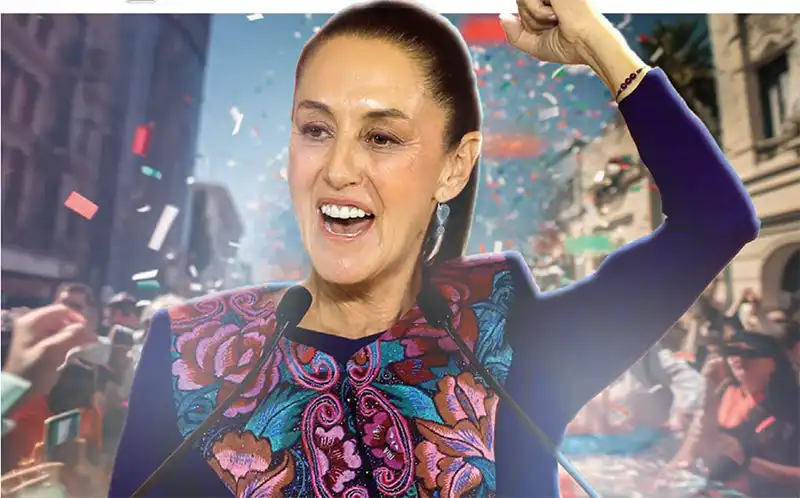Por: Politico
Claudia Sheinbaum was sworn in Tuesday as Mexico’s first female president, riding the enthusiasm over her predecessor’s social programs but also facing challenges that include stubbornly high levels of violence. After a smiling Sheinbaum took the oath of office on the floor of Congress, legislators shouted “Presidenta! Presidenta!” using the feminine form of president in Spanish for the first time in over 200 years of Mexico’s history as an independent country. The 62-year-old scientist-turned-politician receives a country with a number of immediate problems, also including a sluggish economy, unfinished building programs, rising debt and the hurricane-battered resort city of Acapulco. In her inauguration speech, Sheinbaum said that she came to power accompanied by all of the women who have struggled in anonymity to make their way in Mexico, including “those who dreamed of the possibility that one day no matter if we were born as women or men we would achieve our dreams and desires without our sex determining our destiny.”
She made a long list of promises to limit prices for gasoline and food, expand cash hand-out programs for women and children, support business investment, housing and passenger rail construction. But any mention of the drug cartels that control much of the country was brief and near the end of the list. Sheinbaum offered little change from outgoing President Andrés Manuel López Obrador’s ‘Hugs not Bullets’ strategy of addressing root causes and not confronting the cartels, apart from pledging more intelligence work and investigation. “Th ere will be no return to the irresponsible drug war,” she said. Sheinbaum romped to victory in June with nearly 60% of the vote, propelled largely by the sustained popularity of her political mentor, López Obrador. She has pledged to continue all his policies, even those that strengthened the power of the military and weakened the country’s checks and balances.
Aft er the inauguration, Sheinbaum was scheduled to appear later Tuesday at a mass rally in Mexico City’s colo-nial-era main plaza to participate in an Indigenous ceremony in which an elder will hand her a ‘staff of authority.’
Lucía Ruíz, a 42-year-old mother of three, was one of thousands trying to reach the main square to see the rally. She said she hopes Sheinbaum will be able to combat high rates of violence against women in the country.
“She is going to represent us,” said Ruíz. “We have always been governed by men, and they think we’re incapable, but we’re not. We are the head of our families. Mexican President Claudia Shein-baum addresses supporters in the Zócalo, Mexico City’s main square, on her inauguration day, Oct. 1, 2024. | Aurea Del Rosario/AP López Obrador took office six years ago declaring “For the good of all, fi rst the poor,” and promising historical change from the neoliberal economic policies of his predecessors. Sheinbaum promised continuity from his popular social policies to controversial constitutional reforms to the judiciary and National Guard rammed through during his fi nal days in office. Despite her pledge of continuity, Sheinbaum is a very different personality: a cautious scientist and ideological university leftist, as opposed to the outgoing president’s chummy, every-man appeal. “López Obrador was a tremendously charismatic president and many times that charisma allowed him to cover up some political errors that Claudia Sheinbaum will not have that possibility of doing,” said Carlos Pérez Ricart, a political analyst at Mexico’s Center for Economic Research and Teaching. “So, where López Obrador was charismatic, Claudia Sheinbaum will have to be effective.”
She will wield formidable power be-cause López Obrador’s Morena party controls both houses of Congress. But the country remains deeply polarized between the outgoing president’s fanatic fans and almost one-third of the population who deeply resent him. “If we want a strong government, the checks and balances also have to be strong,” said opposition Sen. María Guadalupe Murguía, suggesting that an all-powerful army and unchecked ruling party could come back to haunt Mexico. “Remember,” she said, “nobody wins everything, and nobody loses forever.” Sheinbaum is not inheriting an easy situation. Drug cartels have strengthened their hold over much of Mexico, and her fi rst trip as president will be to the Pacifi c coast resort of Acapulco, which was flooded last week by Hurricane John, which killed at least 17 people along the coast around the resort. Acapulco was devastated in October 2023 by Hurricane Otis, and had not re-covered from that blow when John hit. Sheinbaum must also deal with raging violence in the cartel-dominated northern city of Culiacan, where factional fighting within the Sinaloa cartel broke out aft er drug lords Ismael “El Mayo” Zambada and Joaquín Guzmán López were apprehended in the United States aft er they flew there in a small plane on July 25.
López Obrador has long sought to avoid confronting Mexico’s drug cartels and has openly appealed to the gangs to keep the peace among themselves, but the limitations of that strategy have become glaringly apparent in Culiacan, the capi of Sinaloa state, where gun battles have raged on the city’s streets. Local authorities and even the army — which López Obrador has relied on for everything — have essentially admitted that the fighting will only end when the cartel bosses decide to end it.






